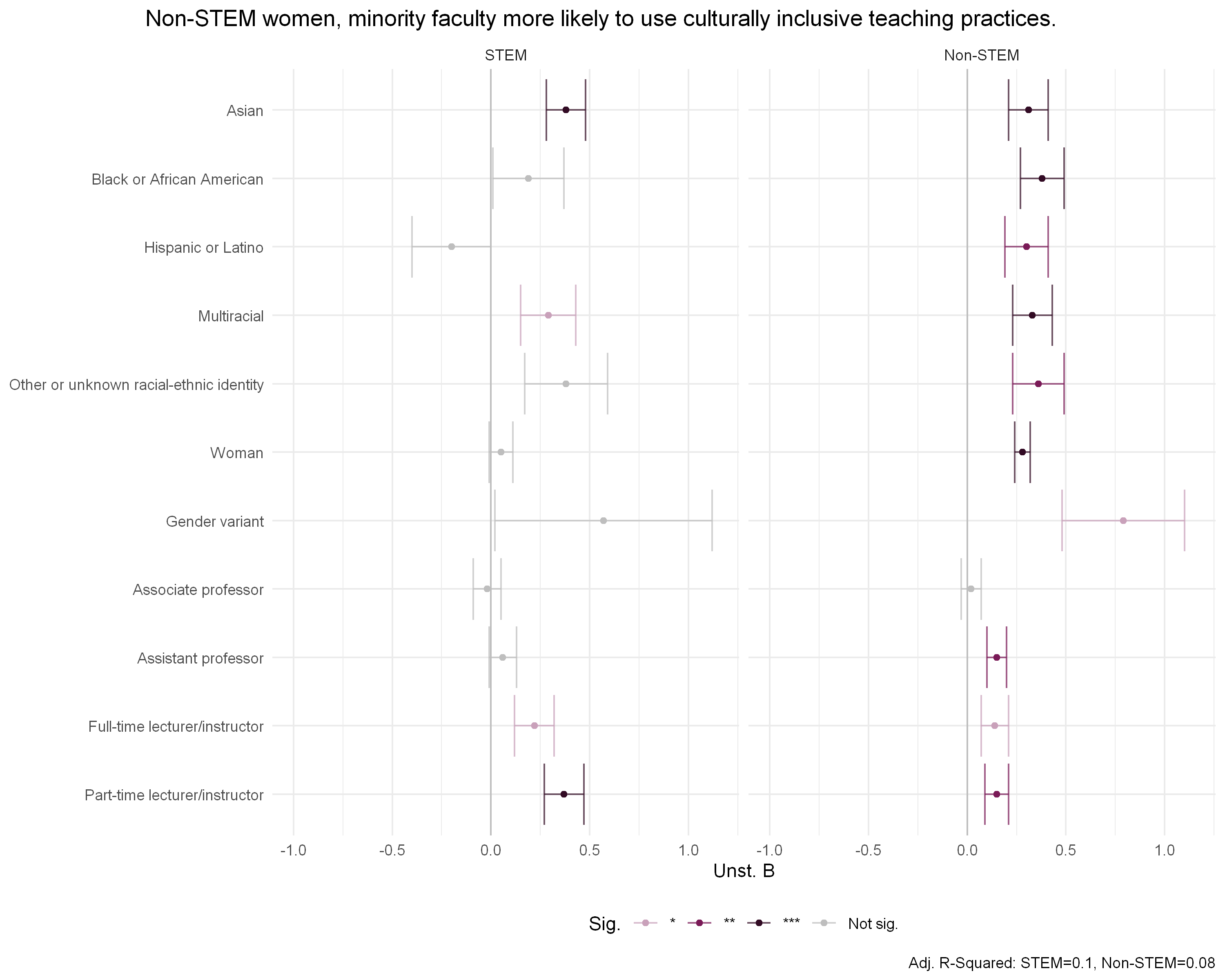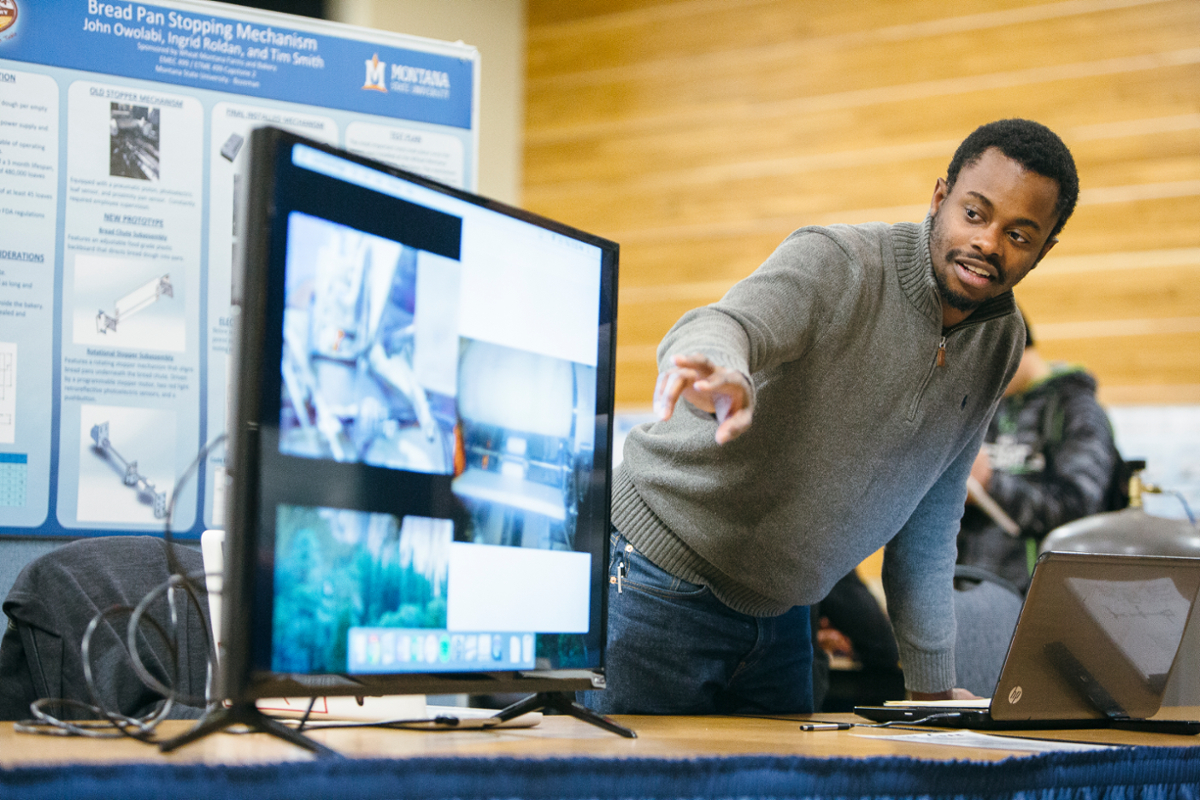Adapted from a presentation given at the Association for the Study of Higher Education, 2018
Calls-to-action from the Science, Technology, Engineering, and Mathematics (STEM) community have directed attention to understanding how classroom environments contribute to high rates of diverse students leaving STEM majors (Killpack & Melon, 2016; Pawley, 2017). This has led to more examination of faculty use of culturally inclusive teaching practices (ITP), which are learning spaces where critical reflection, cultural connection to concepts, and respect for students' diverse backgrounds are valued. We used data from the Faculty Survey of Student Engagement (FSSE) to further explore faculty emphasis of culturally inclusive teaching and whether this varied by racial/ethnic identity, gender identity, academic employment status, and course characteristics for STEM and non-STEM faculty. This study focused on responses from the Inclusiveness and Engagement with Cultural Diversity Topical Module. Our sample included 2,988 faculty members from 30 institutions.
To answer our research questions, we examined descriptive statistics and two multiple regression models, where one displayed results for STEM faculty and the other for non-STEM faculty. An examination of our descriptive statistics showed that STEM faculty emphasized culturally inclusive teaching practices less than non-STEM faculty. Within STEM fields, Asian, Black or African American, and multiracial faculty emphasized these practices more than their White and Hispanic or Latino peers. Within non-STEM fields, Black or African American, Hispanic or Latino, multiracial, and Asian faculty emphasized these practices substantially more than their White peers.
Table 1 displays multiple regression results that show relationships between identity and job characteristics and emphasis of culturally inclusive teaching practices. For STEM faculty specifically, Asian and multiracial faculty, those who are U.S. citizens and lecturers or instructors emphasized these practices more than faculty teaching lower division courses and major-specific courses. For non-STEM faculty, all racial/ethnic categories other than White faculty, women and gender variant faculty, faculty who are assistant professors and lecturers or instructors, faculty teaching small courses, and faculty teaching general education status course emphasize these practices more than their peers.

Based on our findings, STEM faculty are emphasizing culturally inclusive teaching practices less than non-STEM faculty but within group differences highlight further discrepancies among groups. This has broader implications specifically for faculty of color, as for both groups, faculty of color generally tend to emphasize culturally inclusive teaching practices more than White faculty. In STEM fields, this can be troubling as White faculty hold a large majority of faculty positions which can suggest that culturally inclusive teaching practices are not a priority in STEM classrooms. This becomes a systemic issue, as faculty of color are burdened with the responsibility of being "diversity workers" and creating inclusive spaces while still dealing with their own marginalization. We also see this happen with faculty identifying as women, with more pressure on those who hold multiple marginalized identities. If we are able to continue shifting the responsibility of implementing culturally inclusive teaching practices to those faculty who are well-represented in their respective fields, we can increase the amount of inclusive learning environments diverse students are exposed to which can help with their underrepresentation. Our findings also point to a need for continued reexamination of tenure and promotion process and too assess accountability structures for those who do and don't work to create inclusive learning environments.
The full paper can be found here.
References
- Killpack, T. L., & Melon, L. C. (2016). Toward inclusive STEM classrooms: What personal role do faculty play? CBE-Life Science education, 15, 1-9. DOI:10.1187/cbe.16-01-0020
- Pawley, A. L. (2017). Shifting the "default": The case for making diversity the expected condition for engineering education and making Whiteness and maleness visible. Journal of Engineering Education, 106, 531-533.


